Chile Was the Birthplace of Neoliberalism. This Election Could Bury It
A radical socialist runs for president against a Pinochet-imitator.
by Michael Chessum
20 November 2021
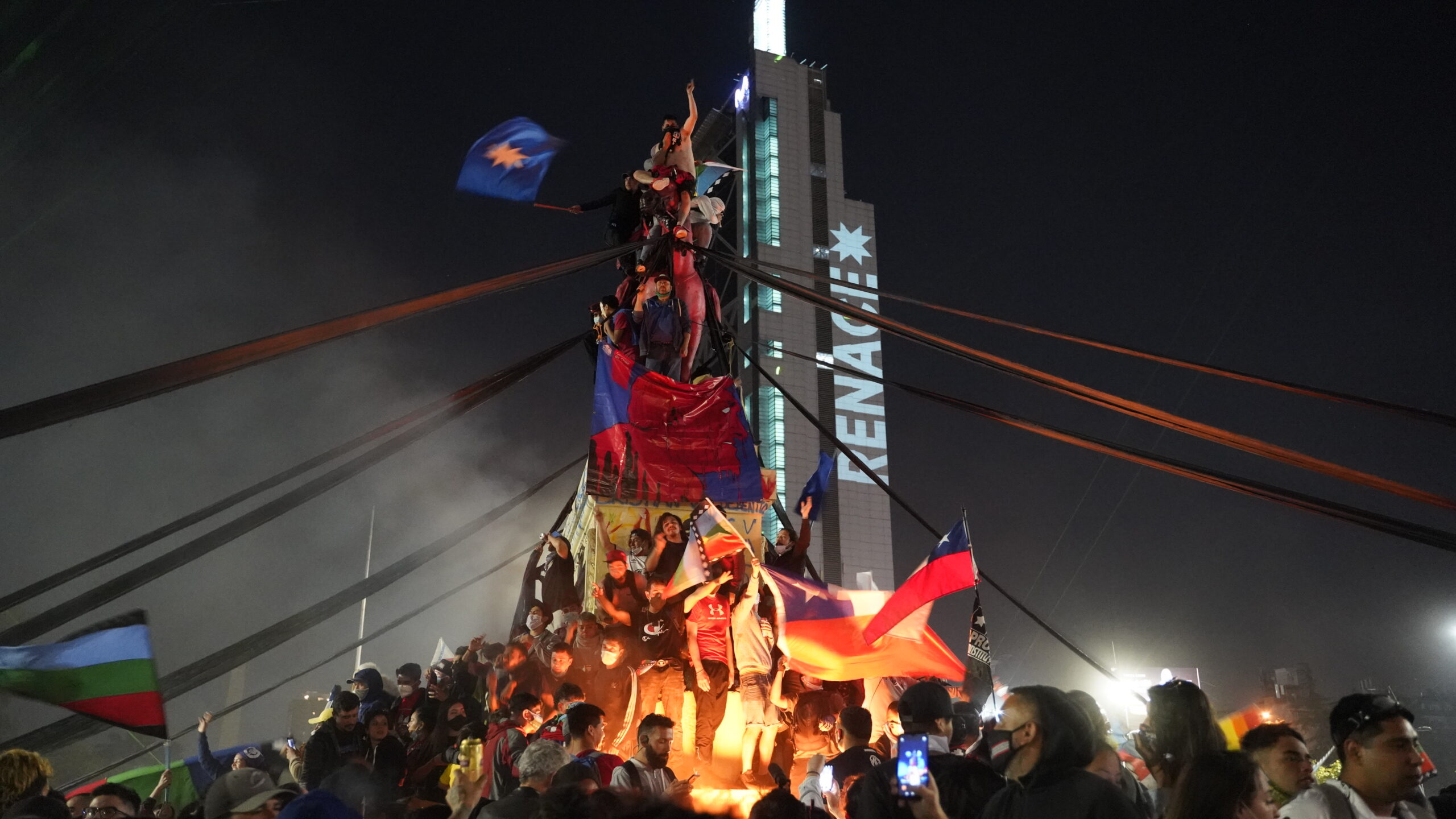
In Santiago, politics slaps you in the face. The city’s boulevards and modern shopfronts feel familiar. Drinking an unpleasantly soapy pale ale in a pop-up bar near Bellavista on a Friday night, you could easily convince yourself you were in London – until the tear gas wafts in. Outside, the streets around Dignity Square (recently renamed by protest) are full of graffiti, aggressive police in body armour and a few small bands of protesters taking part in a weekly Friday ritual, an echo of a much bigger revolt.
Looking around at the clientele – some in suits, some wearing political badges; many, like us, having casually dodged water canons to make it this far down the street – the question I keep asking myself is: “I wonder how these people are voting.” Chile’s presidential elections, the first round of which will be held this Sunday, are likely to be the most important since the fall of the dictatorship in 1990. For decades, Chile has been ruled by a democratic consensus in which parties of both left and right held on to much of the neo-liberal economic model established by US-backed dictator Augusto Pinochet between 1973 and 1990. Now, the electorate is polarising between Gabriel Boric, a young new left candidate built by social movements, and José Antonio Kast, the candidate of the far right who once claimed that “if Pinochet were alive he would vote for me”.
Chile despertó.
The backdrop to this election is what most activists call “the social explosion”, which detonated on 18 October, 2019 in response to a 30 peso (three pence) rise in fares on the Santiago Metro and quickly developed into a revolt whose scale and violence shook Chile. Within a week, 3 million people were on the streets across the country. What began as a school student campaign against a fare increase quickly escalated into the mass destruction of ticket barriers, the occupation of public space and widespread rioting and looting. Barricades became common – part disruptive tactic, part self-defence against police incursion – as the protests became the focal point for the rage of millions of people living in the most deregulated, and the most unequal, economy in the OECD: “it’s not 30 pesos, it’s 30 years”, as the saying went.
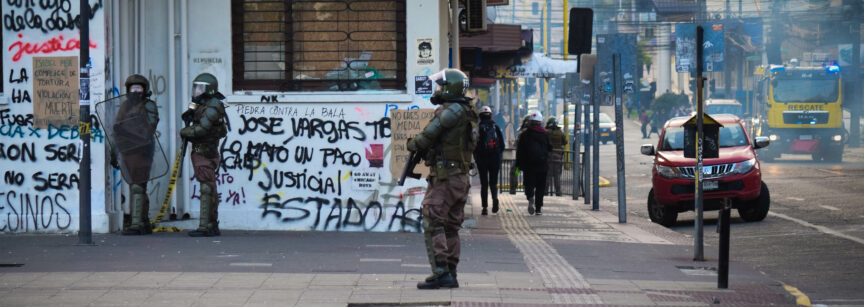
“It was really extreme,” says Tania Sauma, a feminist and Communist Party activist, over a beer at a left-wing community fair in the Villa Olímpica neighbourhood. “For months at a time, Santiago was just shut down. We organised our own community food distribution. Barricades went up all over the city – people would get home after work and ask themselves ‘do I really need this table?’ and on it would go.”
As the movement spread across Chile, it coalesced around a series of demands, first and foremost the transformation of Chile’s abysmal pensions and wages; the resignation of right-wing President Sebastian Piñera; and the rewriting of Chile’s dictatorship-era constitution, which locks in the privatisation of large parts of the economy. The uprising was leaderless, and still defies neat characterisation – but it created the conditions for a political transformation. By early 2020, Piñera had conceded a referendum on constitutional reform, which was won with 80% of the vote. In the subsequent elections for the Constitutional Assembly, a rag-tag coalition of left-wing parties and independents won almost 80% of the seats, and will now be able to author a new constitution for approval via referendum no later than September 2022.
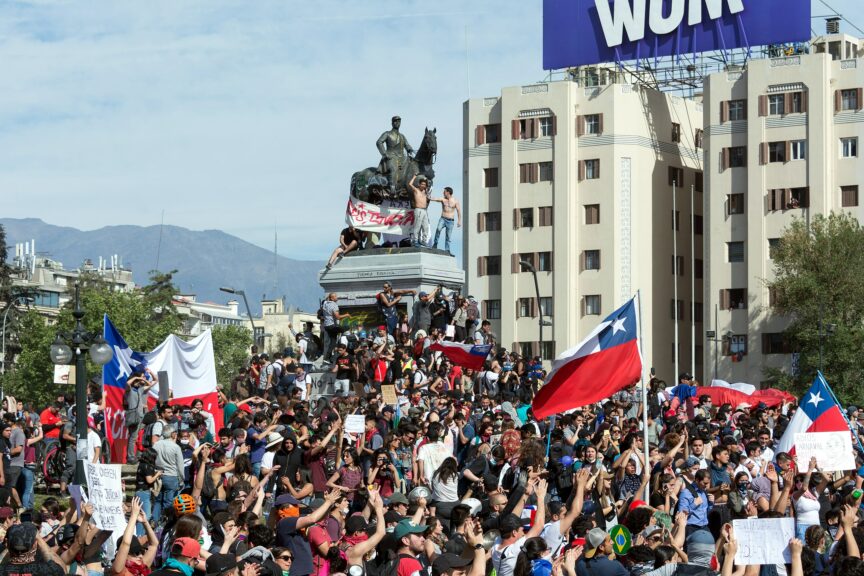
We will read out their names until we die.
On Monday night, I found myself watching the final presidential debate around a dinner table in San Miguel with Francisca Nachar Escobar and her family. “The uprising gave me new hope”, Francisca says. A leftist activist since the age of 14, she had started to burn out by late 2019, “but suddenly it just took off, and it was popular. People would cheer us on from buses. You’d be on the Metro with a banner and everyone would cheer.”
In the wake of the initial explosion, activists focused on building local networks. “I was used to activism at school or on campus,” says Francisca, “but now neighbours who had never been involved in anything before started organising”. As well as organising for protests and for elections, they created a local radio station, food banks and recreational activities. “This country was broken by the dictatorship,” says Pandora, Francisca’s sister, “but now we’re starting to rebuild networks of social solidarity.”
As always in Chile, this all came at a price. Francisca is still facing charges for her involvement. On our way out, her parents (who were activists with the Revolutionary Left Movement in the 1970s) show us the bookcase in their study, a makeshift shrine for their friends and comrades murdered and maimed by the dictatorship. There are now fresh photos on the shelves. Outside the house is draped a gigantic banner bearing the name of Fabiola Campillai, a young firefighter who was blinded and disfigured by a tear gas canister and is now running for Senate.
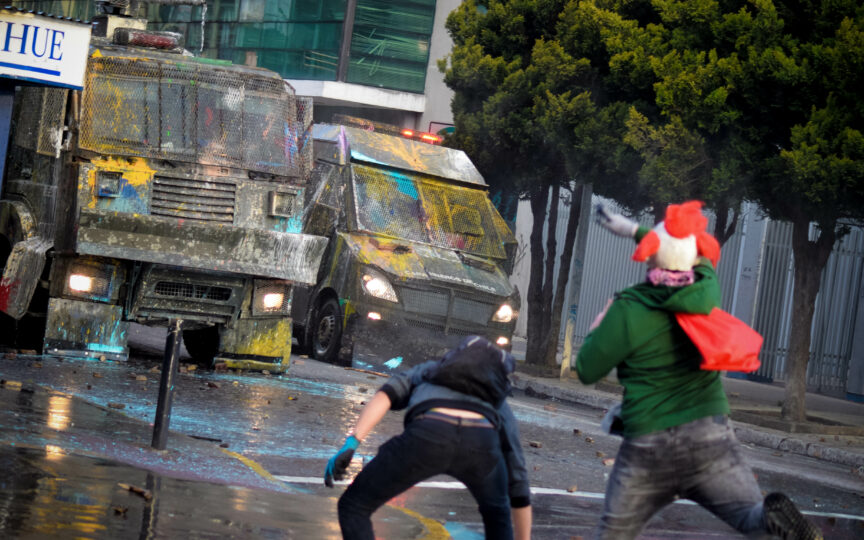
In the course of the protests, forty people have been killed, hundreds blinded and thousands injured, and, in a country in which the accountability of the state has always been shallow, memorialisation takes on a special significance. “Something you have to understand about Chile,” says Tania Sauma, “is that the price of life is high. We don’t leave people behind. We will read out their names until we die.”
A tale of two lefts.
By the time the uprising started, the Chilean left had already undergone a transformation. At more than a hundred years old, the Chilean Communist Party (PCCh) predates the Bolshevik Revolution. It is by far the largest Communist Party in Latin America, and its tradition is democratic and reformist, working with broad alliances and seeking change through constitutional means. It is also, inescapably, rather orthodox: it does not permit internal factions, enforces central discipline and only allows its members to debate its strategy at its party congress every few years. For many years, that strategy was to participate in the centrist and centre-left governments that followed the end of the dictatorship, a fact which made it toxic to many young radicals.
But the fact that the PCCh is a mass party has meant that change has got into it through its roots. The feminist movement, a major force across the latest generation of the Chilean left, has made significant progress inside it. And a new generation from the student uprising of 2011 and newer social movements has come to the fore, pushing it towards more radical-left electoral alliances, and away from some of its more Stalinist international politics. When the party released a statement supporting Daniel Ortega’s election victory in Nicaragua (an election widely believed to be rigged) dissent came not just from the PCCh’s allies, but from within its own ranks, including former student icon congresswoman Camilla Vallejo and the party’s official youth wing.
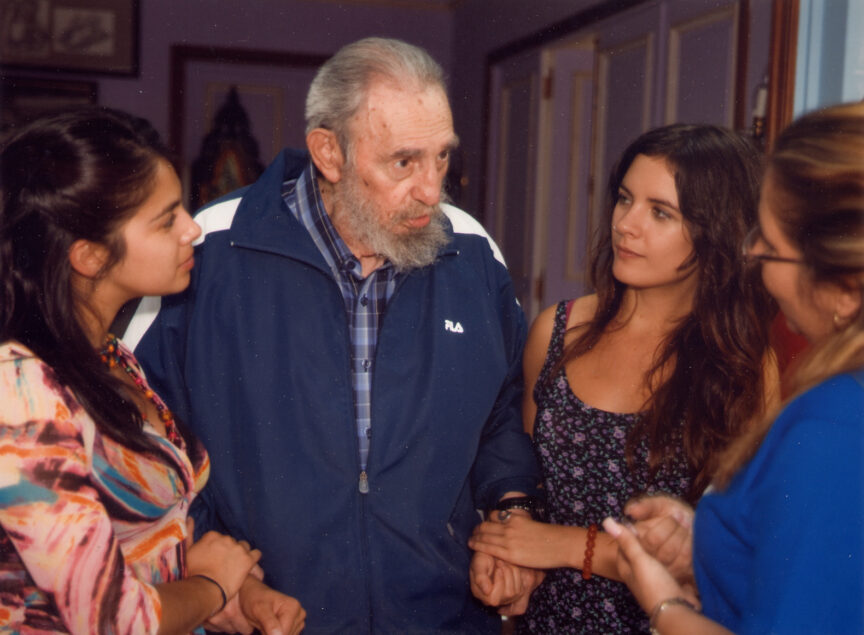
Gabriel Boric is the presidential candidate not of the Communist Party but of the Broad Front, an umbrella coalition founded in 2017 for much of the new radical left, whose internal politics is far more pluralist and intricate. “You know those Russian mamushka dolls?” asks Gonzalo Cuadra, an activist within it, “you need to have them in mind when you think about the Chilean left.” Boric’s party within the Broad Front (there are several) is Social Convergence, itself a fusion of three libertarian left and autonomist groups, and within those there is an even finer tapestry of tendencies.
As across much of the world, the social movements 2011 produced a new generation of left leadership in Chile. While in the UK this new left was swallowed up into Labour (in large part because of our electoral system) here it formed its own political institutions. Boric was a student leader in 2011 and, having unexpectedly beaten charismatic Communist Mayor Daniel Jadue in the left’s primary last year, he could in less than a month be the youngest ever President of the Republic.
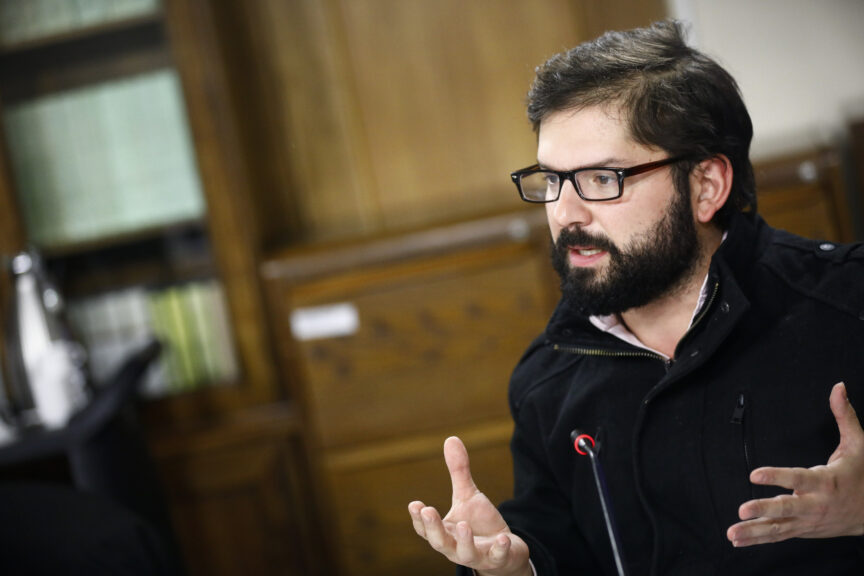
The uprising gave everyone on the new left a shock. “On the one hand”, says Gonzalo Cuadra, “we were all scared of the backlash and the repression. But on the other hand, this hollowed-out neo-liberal country suddenly felt like it might become a decent place to live.”
It also rocked the fledgling institutions of the new left, when last year the Broad Front was invited (alongside centre, right and far right) to negotiate the agreement which paved the way for the election of the new Constitutional Assembly. With the protests rolling on and public opinion polarising around them, Gabriel Boric, along with a majority of the Broad Front, participated in the discussions and signed on the dotted line. This caused opprobrium within the Broad Front’s own ranks, leading to a split from its left, and drew strong condemnation from the Communist Party. “We were in this kind of pre-revolutionary moment,” says Communist activist Tania Sauma, “but we never got to see where it led. We’re now living in a world in which the boundaries of what is possible were set by the agreement.”
Spend any time with activists, and fundamental disagreements are never far away. “Right now we are fighting together and we are fighting to win,” says Tania Sauma. “But we still want different things for the country – we want socialism.” Communist Party militants complain that many in the Broad Front’s leadership are drifting towards social democracy, their outsider mission slowly being replaced by a drive to renew the centre left. Broad Front activists counter that the Communist Party is hierarchical and opportunist, and that it was it, not them, who propped up the establishment coalition governments of previous decades.
What is perhaps more striking, to the outsider, is the fact that – despite how high the stakes are – the new generation on both sides of the Chilean left seems determined to work together. Many of them know each other, and went to the same universities at the same time. Their blend of discipline and pluralism may be the creative, antagonistic fusion needed to win the election.
A dark alternative.
For now, the intricacies of the Chilean left are neither here nor there. Come the second round of these elections on 20 December, Boric will be pitched against Jose Antonio Kast, whose programme binds right-wing economics to a deepening authoritarian agenda. Kast has run for president before, but in 2017 polled just 8%, widely believed to be the ceiling for the Pinochetista vote. But that was before the centre-right’s vote collapsed, and before the social uprising and a wave of feminist struggle in 2018, both of which garnered a substantial backlash. He is now certain to make the run-off, and, according to some polls (which are, it must be said, especially unreliable in Chile) could beat Boric.
In power, Kast proposes to return Chile to a ban on abortion in all circumstances, and to weed out “gender ideology” in society. He has even pledged, in the best tradition of the new far right, to build a ditch around Chile’s borders to prevent illegal immigration. In response to the uprising, Kast’s posturing reflects the ‘politics of anti-politics’ that has characterised the authoritarian right in Chile and across the continent: his overarching promise is to make mass mobilisation in society go away, by increasing the level of state police violence and persecuting the left and progressives. “If it wasn’t for Bolsonaro,” says Gonzalo Cuadra, “I’d only be able to imagine what it would be like.”
Many activists are quietly confident about beating Kast in the final round. But this moment is dangerous and unpredictable. Noam Titelman is a political scientist at the LSE who was one of the leaders of the Chilean student movement in 2011, alongside Gabriel Boric. “You have to remember,” he says, “that party identification is historically low, so is voter turnout, and so is identification on the left-right spectrum.” The key thing to understand about the past two years is that, “rather than being a turn to the left, it’s been a turn against the elites. And while that turn has for some time been expressed in more progressive demands, it could at any moment be expressed by the far right.”
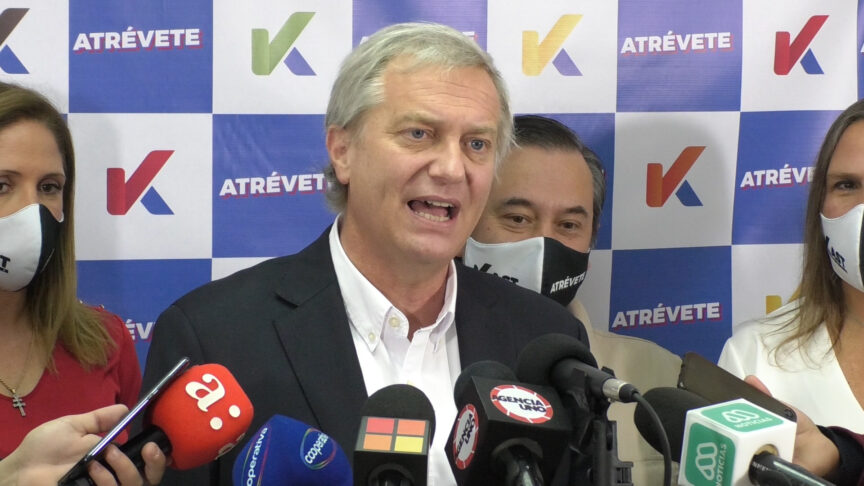
All over the world, a process is underway. In the long hangover after the financial crash, neo-liberal economics has lost popular consent, and an often explosive anti-establishment sentiment has gripped society. In response, the elite has turned to its extreme right – to a politics of borders, authoritarianism and ultra-conservatism – to maintain an electoral coalition.
This process has pitched a new far right in a head-on battle with a new left, which has emerged, half-ready for the task, from a decade of social unrest. Again and again in the course of this campaign, Gabriel Boric has taken to the stage to declare that “if Chile was the birthplace of neoliberalism, it will also be its graveyard”. The movement that stands behind him now stands on the brink of victory, and on the brink of catastrophe.
Find more of Novara Media’s recent Latin American coverage here.
Michael Chessum is a socialist activist and writer based in London.


